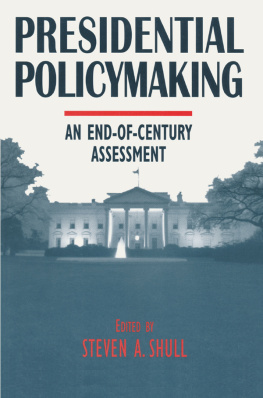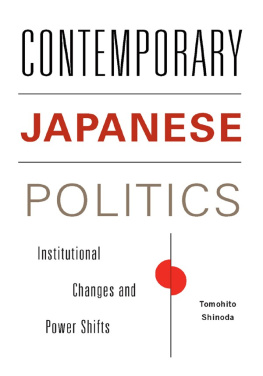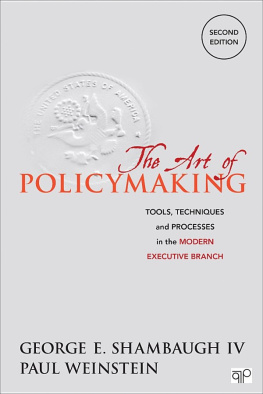
Patterns of Japanese Policymaking: Experiences from Higher Education
Westview Replica Editions
This book is a Westview Replica Edition. The concept of Replica Editions is a response to the crisis in academic and informational publishing. Library budgets for books have been severely curtailed; economic pressures on the university presses and the few private publishing companies primarily interested in scholarly manuscripts have severely limited the capacity of the industry to properly serve the academic and research communities Many manuscripts dealing with important subjects, often representing the highest level of scholarship, are today not economically viable publishing projects. Or, if they are accepted for publication, they are often subject to lead times ranging from one to three years. Scholars are understandably frustrated when they realize that their first-class research cannot be published within a reasonable time frame, if at all.
Westview Replica Editions are our practical solution to the problem. The concept is simple. We accept a manuscript in camera ready form and move it immediately into the production process. The responsibility for textual and copy editing lies with the author or sponsoring organization. If necessary we will advise the author on proper preparation of footnotes and bibliography. We prefer that the manuscript be typed according to our specifications, though it may be acceptable as typed for a dissertation or prepared in some other clearly organized and readable way. The end result is a book produced by lithography and bound in hard covers. Initial edition sizes range from 400 to 600 copies, and a number of recent Replicas are already in second printings. We include among Westview Replica Editions only works of outstanding scholarly quality or of great informational value and we will continue to exercise our usual editorial standards and quality control.
Patterns of Japanese Policymaking: Experiences from Higher Education
T. J. Pempel
The author of this study of policymaking in postwar Japan contends that the prevailing perceptions of the subject advanced to date are inadequate. Professor Pempel identifies three distinct patterns of policymaking within Japans current system of hegemonic pluralism. One of these, policymaking by camp conflict, is associated with broad, highly emotional, ideological issues that polarize political forces and that are resolved only after widely publicized battles in the Diet, the media, and the streets. A second pattern, incremental policymaking, involves nonideological problems that are settled largely through bureaucratic procedures almost totally removed from public scrutiny. A third pattern, pressure group policymaking, pits a limited number of special interest groups against one or more government agencies? this process is less conflictual and public than camp conflict, but more visible and antagonistic than incremental policymaking.
These patterns are examined both theoretically and empirically and are thoroughly tested in the areas of university administration, enrollment expansion, and specialization in higher education. The results have import for Japan scholars and will be of interest also to students of comparative education and public policy.
T. J. Pempel, associate professor of government at Cornell University, is currently engaged in an investigation of the Japanese state bureaucracy and in a project on comparative public policy in Japan, France, West Germany, Britain, and the United States.
Studies of the East Asian Institute of Columbia University
This volume is included in the Studies of the East Asian Institute of Columbia University. The institute was established in 1949 to prepare graduate students for careers dealing with East Asia and to aid research and publication on East Asia during the modern period. The Studies of the East Asian Institute were inaugurated in 1962 to bring to a wider public the results of significant new research on modern and contemporary East Asia.
First published 1978 by Westview Press
Published 2019 by Routledge
52 Vanderbilt Avenue, New York, NY 10017
2 Park Square, Milton Park, Abingdon, Oxon OX14 4RN
Routledge is an imprint of the Taylor & Francis Group, an informa business
Copyright 1978 Taylor & Francis
All rights reserved. No part of this book may be reprinted or reproduced or utilised in any form or by any electronic, mechanical, or other means, now known or hereafter invented, including photocopying and recording, or in any information storage or retrieval system, without permission in writing from the publishers.
Notice:
Product or corporate names may be trademarks or registered trademarks, and are used only for identification and explanation without intent to infringe
Library of Congress Catalog Card Number: 78-15846
ISBN 13: 978-0-367-28245-5 (hbk)
For my parents
Agnes F. Pempel and the late Thomas D. Pempel
I owe a great debt to many individuals and institutions for help in completing this work. The greatest intellectual debts are to Peter Katzenstein, Kitamura Kazuyuki, Theodore Lowi, Mizuno Kunitoshi, James Morley, and Nagai Michio. The bulk of the financial support for my research in Japan was provided by the U.S. Education Commission through a Fulbright Fellowship. The East Asian Institute at Columbia University and the China-Japan Program at Cornell University provided additional financial help plus office space, administrative assistance, and an environment conducive to research and writing.
In addition to those named above, I would like to thank Douglas Ashford, George Z.F. Bereday, John C. Campbell, Gerald Curtis, David Mozingo, Herbert Passin, William Steslicke, Sunada Ichir, Sidney Tarrow, Terasaki Masao, Norman Uphoff, and Herschel Webb for various comments and suggestions during the writing and rewriting stages.
While in Japan, I received invaluable help from the Ministry of Education, the National Diet Library, and the National Institute for Educational Research.
I would also like to thank the dozens of individuals who took time out from busy schedules to allow themselves to be interviewed for one or another phase of the research.
Laurie Ann Schlansky, Tammy Thompson, and Yvonne Yung all provided important research assistance. Mervyn Adams supplied yeoman help in the editorial work.
Alice McDowell Pempel, by refusing to become a captive to my research and by the excited pursuit of her own, provided me with an invaluable oasis and a constant sense of perspective.
1.
Introduction
How do governments formulate policies to regulate behavior in their societies? By whom are the decisions made, through what structural arrangements, and in response to which of the many demands and pressures extant in the society; how do these differ from problem to problem, and from regime to regime? Such questions have been at the heart of political science through its long evolution, for it is in grappling with such questions that abstractions such as liberty, equality, authoritarianism, corporatism, capitalism, oppression, and democracy take on tangibility, concreteness, and visibility.
This is a book about policymaking in Japan since World War II. It contends, among other things, that the dominant perceptions of the subject advanced to date are inadequate. Much of the present writing, for example, implies that there is some single, clearly identifiable policymaking process in Japan. Usually this is seen to revolve around a ruling triumvirate of the conservative Liberal Democratic Party (LDP), big business circles, and the senior echelons of the national bureaucracy. All three are seen to rule the country in combinationthe three legs of a tripod, each serving as an equally critical support.throughout the literature of vernacularisms which at least implicitly convey a lack of parallel to behavior in other societies: ringisei , hanashiai , nemawashi , keiretsu , oyabun-kobun , giri-ninjo , and the like.











